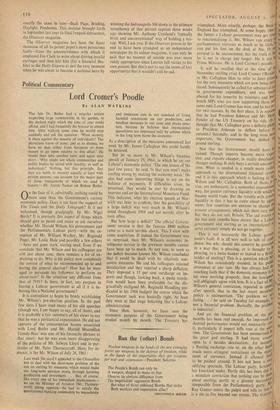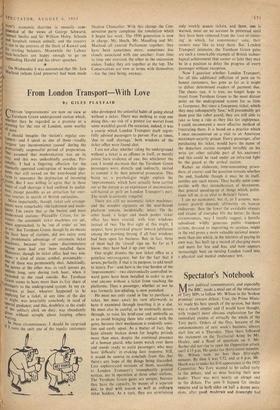Political Commentary
Lord Cromer's Poodle
By ALAN WATKINS The late Dr. Butler had a singular notion respecting large communities in his garden, in the darkest night which the time of year could afford, and I had frequently the honour to attend him. After walking some time he would stop suddenly and ask the question : 'What security is there against the insanity of individuals? The physicians know of none; and as to divines, we have no data either from Scripture or from reason to go upon relative to this affair.' He would then take another turn, and again stop short: 'Why might not whole communities and public bodies be seized with insanity, as well as individuals? Nothing but this principle, that they are liable to insanity equally at least with private persons, can account for the major part of those transactions of which we read in history.'—Dr. Josiah Tucker on Bishop Butler.
ON the face of it, admittedly, nothing could be more sane than the Government's current economic policy. Does it not have the support of The Times and the Daily Telegraph? Is it not welcomed, though grudgingly, by Mr. Nigel Birch? It is precisely this aspect of things which should give us pause and make us ask ourselves whether Mr. Harold Wilson, his government and the Parliamentary Labour party—with the ex- ception of Mr. William Warbey, Mr. Reginald Paget, Mr. Leslie Hale and possibly a few others —have not gone stark, staring mad. Even if we conclude that Mr. Wilson and his colleagues are still just about sane, there remains a lot of ex- plaining to do. Why is his policy now completely the reverse of what he recommended up to and during the general election? How has he man- aged to persuade his followers to perform an about-turn? Is the situation any different from that of 1931? Is there, in fact, any purpose in having a Labour government at all if it is be- having like a National government?
It is convenient to begin by firmly establishing. Mr. Wilson's pre-election position. In the past few days I have read many of his old speeches (though not, I am happy to say, all of them), and it is probably a fair summary of his views to say that he was a puritanical expansionist. He did not approve of the consumption booms associated with Lord Butler and Mr. Harold Macmillan (`candy-floss' was one of his favourite phrases at that time): but he was even more disapproving of the policies of Mr. Selwyn Lloyd and in par- ticular of Mr. Peter Thorneycroft. Here, for in- stance, is the Mr. Wilson of July 26, 1961 : Last week [he says] I appealed to the Chancellor not to deal with the short-term problem of the run on sterling by measures which would make our long-term position worse through harming production and investment. . . . But, of course, like every one of his immediate predecessors— we see the Minister of Aviation [Mr. Thorney- croft] sitting opposite—he had to satisfy the international banking community by masochistic
and irrelevant cuts in our standard of living, harmful restrictions on our production, and needless increases in our costs and prices struc- ture, because he believes that international speculators are impressed only by actions which in the long term harm the economy.
As a description of the measures announced last week by Mr. James Callaghan this could hardly be bettered.
But let us move to Mr. Wilson's Swansea speech of January 25, 1964, in which he set out Labour's economic policy. The one lesson Of the past few years,' he said, `is that you won't make sterling strong by making the economy weak.' He also had some interesting things to say on the balance of payments. If difficulties arose, he promised, they would be met by drawing on reserves and on the International Monetary Fund. This indicates, what his election speech at Nor- wich was later to confirm, that the possibility of a large deficit was very much in Mr. Wilson's mind throughout 1964 and not merely after he took office.
But how large a deficit? The official Govern- ment version is that the famous £800 million came as a most terrible shock. This I view with some scepticism. If indeed the Government was so surprised, then Mr. Wilson's economic in- telligence service in the previous months cannot have been up to much. At any rate, as soon as the deficit became known Mr. Wilson concluded that it could be dealt with by relatively non- severe measures. He and his colleagues rejected devaluation and they rejected a sharp deflation. They imposed a 15 per cent surcharge on im- ports and though, looking back, a quota restric- tion would have been preferable (as the dis- gracefully maligned Mr. Reginald Maudling pre- dicated in his 1964 budget) the course which the Government took was basically right. At least they were at that stage behaving like a Labour administration.
Since then, however, we have seen the economic purpose of the Government being eroded month by month. The Treasury has
SPECTATOR, AUGUST o. 196 S triumphed. More exactly, perhaps, the Bank England has triumphed. At some happy time P the future a Labour government may get ro to renationalising it. Mr. Wilson can enjoy h" a parliamentary victories as much as he likes, can put his feet on the desk at No, 10 ae h pretend to be unconcerned, but the truth is theb he is not in charge any longer. He is not a Prime Minister. He is Lord Cromer's poodle. It will be recalled that at the time of Ib November sterling crisis Lord Cromer (`RowleY as Mr. Callaghan likes to refer to him) press for the very measures which are now being hitt duced. Subsequently he called for substantial ell in government expenditure, and was loft abused for his temerity by ministers and bac., bench MPs who are now supporting those sell same cuts. Lord Cromer has won, and he has vio for two reasons. In the first place, it is report that he had President Johnson and Mr. I-0 Fowler of the US Treasury on his side. (It thought that Mr. Callaghan gave a definite pled to President Johnson to deflate before autumn.) Secondly, and in the long term int),, It important, the Government has deified 1°' pound sterling.
Not that the Government should have dr valued. Though imports become more exPeil' sive, and exports cheaper, in reality devaluatiel .,' changes nothing. It only buys a certain amount °I time. What is needed is a much more radta approach to the international financial systal and it is this approach which is lacking in MI: Wilson and Mr. Callaghan. Both of them, it I true, are enthusiasts, in a somewhat convention way, for greater currency liquidity with which to finance world trade. But the trouble with greate liquidity is that it has to come about by agree' ment; few countries are anxious to change present arrangements, which suit them very Weli But they do not suit Britain. The sad events t); the last nine months have shown that a Laboll government and sterling as an international serve currency simply do not go together.
This is not necessarily the Labour govern; ment's fault. It is all very well to talk of cone dence, but why should this country be govern in a way that is pleasing, or is thought to 1/ pleasing, to a Swiss banker or indeed to a Brills holder of sterling? This is a question which Wilson has consistently avoided, in his pubf, utterances at any rate. He has always had 0,1' touching faith that if the domestic economy is his view working properly, then the foreign,er will obligingly agree with him. It is a fact of Nil, Wilson's general conviction, repeated in specs" after speech, that in the last resort monein': policy is unimportant. `The problem we facing . . .' he said on Tuesday for example, not a financial problem. Basically, the problem is industrial.' And yet the financial problem of the 13?0 _. months has been real enough. An improved 11', dustrial performance would not necessarily clic'. it, particularly if import bills rose at the sal; time. The Government has been mesmerised '5 the great god sterling. It had many course, open to it besides devaluation: for instant, a floating exchange rate or, on the other hall; much more stringent restrictions on the move' ment of currency. Instead it allowed itsc,.4 to be pushed around. It has not been a vc'; edifying spectacle. The Labour party, howev, has knuckled under. Partly this has been due , a mistaken conviction that nothing can be don es about sterling; partly to a gloomy masocIflif, inseparable from the Parliamentary party. it Ray Gunter enters the pulpit and tells us that,,, is a sin to live beyond our means. The Gyve'
(
tc fm
P C
SI It P fc
tl
91, tic
q It
lS
it
ti r.
Is
tl e
inent's economic doctrine is uneasily com- Pounded of the views of George Schwartz, Samuel Smiles and Sir William Haley. Schools a nd hospitals remain unbuilt, and the country Is. run in the interests of the Sheik of Kuwait and 11,1s sterling balances. Meanwhile the Labour pack-benchers are happy enough to go on aPplauding Harold and his clever speeches.
_On Wednesday it was announced that Mr. lain Macleod (whom God preserve) had been made Shadow Chancellor. With this change the Con- servative party completes the revolution which it began last week. The 1950 generation is now in charge. Mr. Heath, Mr. Maudling and Mr. Macleod all entered Parliament together; they have been sometimes more, sometimes less closely associated with one another; from time to time one overtook the other in the succession stakes. Today they are together at the top. The Conservatives ate now at terms with themselves —for the time being, anyway.































 Previous page
Previous page